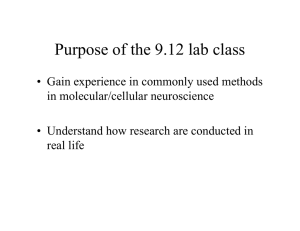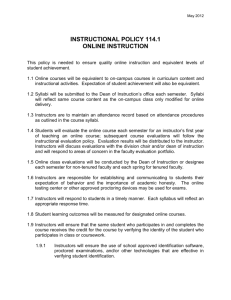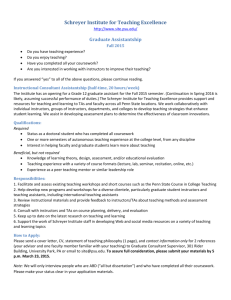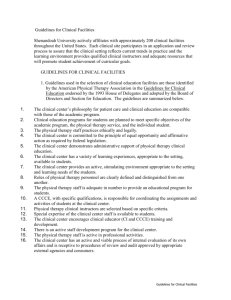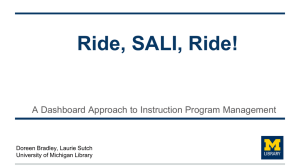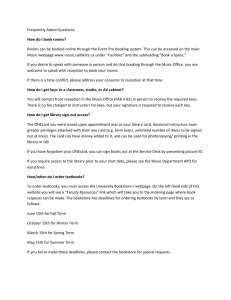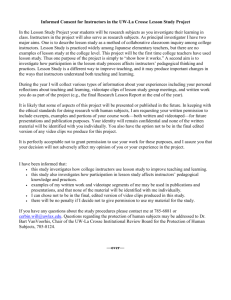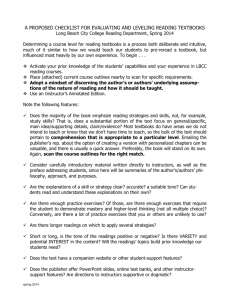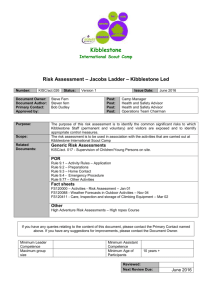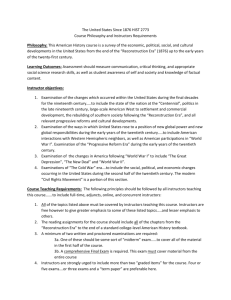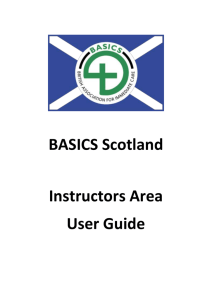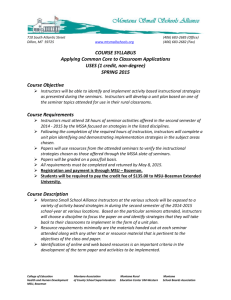Teaching Labs More Effectively
advertisement
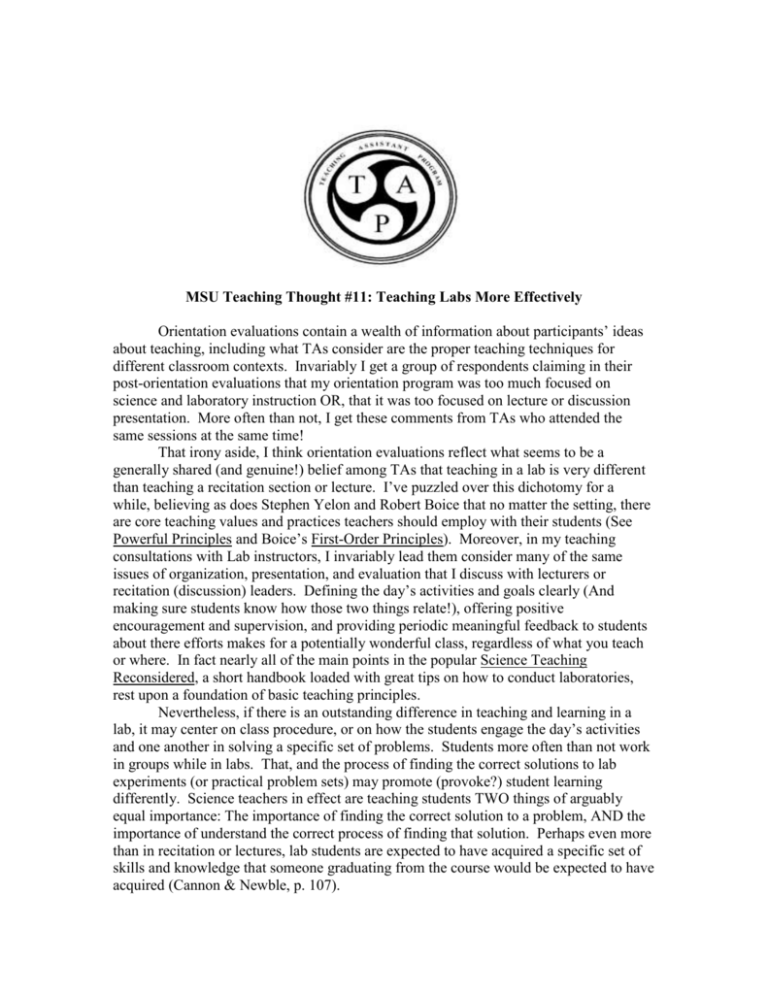
MSU Teaching Thought #11: Teaching Labs More Effectively Orientation evaluations contain a wealth of information about participants’ ideas about teaching, including what TAs consider are the proper teaching techniques for different classroom contexts. Invariably I get a group of respondents claiming in their post-orientation evaluations that my orientation program was too much focused on science and laboratory instruction OR, that it was too focused on lecture or discussion presentation. More often than not, I get these comments from TAs who attended the same sessions at the same time! That irony aside, I think orientation evaluations reflect what seems to be a generally shared (and genuine!) belief among TAs that teaching in a lab is very different than teaching a recitation section or lecture. I’ve puzzled over this dichotomy for a while, believing as does Stephen Yelon and Robert Boice that no matter the setting, there are core teaching values and practices teachers should employ with their students (See Powerful Principles and Boice’s First-Order Principles). Moreover, in my teaching consultations with Lab instructors, I invariably lead them consider many of the same issues of organization, presentation, and evaluation that I discuss with lecturers or recitation (discussion) leaders. Defining the day’s activities and goals clearly (And making sure students know how those two things relate!), offering positive encouragement and supervision, and providing periodic meaningful feedback to students about there efforts makes for a potentially wonderful class, regardless of what you teach or where. In fact nearly all of the main points in the popular Science Teaching Reconsidered, a short handbook loaded with great tips on how to conduct laboratories, rest upon a foundation of basic teaching principles. Nevertheless, if there is an outstanding difference in teaching and learning in a lab, it may center on class procedure, or on how the students engage the day’s activities and one another in solving a specific set of problems. Students more often than not work in groups while in labs. That, and the process of finding the correct solutions to lab experiments (or practical problem sets) may promote (provoke?) student learning differently. Science teachers in effect are teaching students TWO things of arguably equal importance: The importance of finding the correct solution to a problem, AND the importance of understand the correct process of finding that solution. Perhaps even more than in recitation or lectures, lab students are expected to have acquired a specific set of skills and knowledge that someone graduating from the course would be expected to have acquired (Cannon & Newble, p. 107). So, what makes for great Lab instruction? Not only an awareness of the basics of presenting, but also a greater understanding of how group work fits within a larger context. Good lab instructors are both great teachers AND great managers. They get their students to understand the importance of the day’s activities by first clearly explaining the significance of the activity. Good Lab instructors are always seeking to make experiments and practical problems relevant. In fact some of the best lab instructors turn their experiments into practical problem solving exercises (MSU’s Randy Hicks, Ph.D. Candidate in Chemistry has developed a very interesting Lab exercise using just this approach). Good lab instructors spend time early in the semester preparing their students to work in groups. They assign them to work within specified roles, to use one another to reach solutions, to, in effect “jigsaw” results by using different lab groups to provide different pieces of the solution “puzzle.” Good instructors offer just enough help, forcing students to solve problems on their own. Finally, great lab instructors have eyes in the back of their head and are always alert for potential problems. They ALWAYS address safety issues before turning students loose on experiments, no matter how benign the exercise may seem. Shared effort, students’ movement around the class, and one moments’ inattention can make filling a glass with water a potentially hazardous enterprise. We will deal with more on this topic later in the semester when our discussion turns to how most effectively to use textbooks and lab manuals to promote student learning. Consult a few of the sources below for a good understanding of what makes for effective presenting. Teaching tip: Create Labs that address “real life” issues. On the other hand, if your curriculum is set and tightly controlled, find ways to bring in relevant contemporary information into your discussion of Lab exercises. Resources (An “*” indentifies a particularly good resource(s) for today’s topic.) Boice, Robert. First-Order Principles for College Teachers: Ten Basic Ways to Improve the Teaching Process. Bolton, MA: Anker Publishing Company, Inc., 1996. *Cannon, Robert, and Newble, David. “Teaching Practical and Laboratory Classes.” In A Handbook for Teachers in Universities and Colleges: A Guide to Improving Teaching Methods. 4th Edition. Sterling, VA: Stylus Publishing, Inc., 2000. 104118. Committee on Undergraduate Science Education. Science Teaching Reconsidered: A Handbook. Washington, D.C.: National Academy Press, 1997. Hazel, E., and Baillie, C. Improving Teaching and Learning in Laboratories. Jamieson, Australia: HERDSA Publications, 1998. Matthews, Michael R., Ed. History, Philosophy, and Science Teaching: Selected Readings. New York: Teachers College Press, 1991. McKeachie, Wilbert J. “Laboratory Teaching.” In Teaching Tips: A Guidebook for the Beginning College Teacher. 8th Edition. Lexington, MA: D.C. Heath and Company, 1986, 167-169. Paulson, Donald R. “Active Learning and Cooperative Learning in the Organic Chemistry Lecture Class.” Journal of Chemical Education Vol. 76, 8 (August 1999): 1136-1140. Samberg, Tris, Wiegand, Deborah, and Selfe, Sarah. “Course Specific Resource Manual for Chemistry Laboratory Courses.” In The TA Experience: Preparing for Multiple Roles: Selected Readings from the 3rd National Conference on the Training and Employment of Graduate Teaching Assistants. Karron G. Lewis, Ed. Stillwater, OK: New Forums Press, 1993, 232-239. Yelon, Stephen L. Powerful Principles of Instruction. White Plains, NY: Longman Publishers, 1996. Nest Week: The “Principles Vs. Practice” Debate
